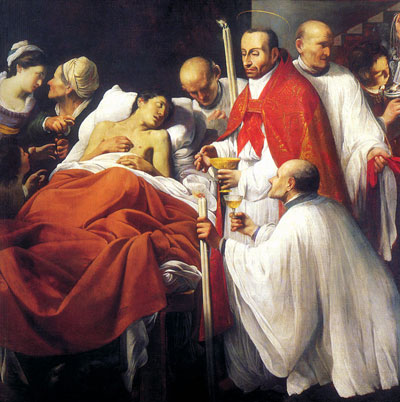 Taken from: Mario Vanti, I Camilliani, il Manzoni e la Peste del 1630
Taken from: Mario Vanti, I Camilliani, il Manzoni e la Peste del 1630
An integral part of Camillian ministry is caring for the dying in their homes. During the whole of the seventeenth century, especially, this was done on such a large scale as to earn the Camillians the fine title of Fathers of the Good Death or of Good Dying. In Sicily it became a proverb: ‘you are as insistent as a Crucifer at the bedside of a dying man’. Otto Cima declared that in Milan ‘a half intention to die was enough’ to find a Camillian at your bedside.
Cardinal Federico did not forbid the Camillians from engaging in such a ministry. The situation was rather that they could not apply it until 1630, unless on a small scale, because of the great amount of work that they had at the hospital and because of their living quarters of the Annunziata where they learnt to live with great sacrifice and in numbers that were too limited, compared to what was needed, that is to say to the requests that were made to them from every part of the city.
With all of this, not less than fifteen religious, usually, were available for caring for the dying in their homes. They alternated in this work with twenty-five religious at the hospital, doing the work in rounds for two or three weeks in Pio Lungo and one week in the religious house. These were the instructions of the Founder and they had been approved by the Holy See.
To combat the plague all their resources and activities were called into play and in addition they were exposed to great danger. ‘Works and charity’, it appears the Founder St. Camillus repeated to his sons, almost all of whom had known him, ‘works and charity are now wanted of us’ by the Lord and society. And they generously entered the fray. The Camillians in the hospital no longer accepted replacements and when they did so this was because one of the religious had died. The Camillians in the city were divided into groups: some went to the plague hospital of Santa Barnaba and others went here and there, that is to say where the need was greatest.
Brother Filippo Visconti, the prior of the religious house of St. Mark, who was a witness to what happened in Milan, left us a very happy testimony in favour of the Camillians, we may venture to at least suppose, which, although it does not name the Camillians, identifies them through the ministry that was specific to them: ‘Piissimi Religiosi, qui curam infirmorum et decedentium mira charitate desumeabant’. We do not want, for that matter, to attribute to ourselves so much honour which can rightly belong to all the religious.
Cardinal Federico, says another chronicler, ‘allowed many religious to go about the city to engage in the office of pity to help the dying: indeed, he obtained from the Supreme Pontiff a jubilee from all those priests and religious who had administered the Most Holy Sacrament to the infected’.
Ripamonti wrote: ‘[It was] a fine thing to see the religious [he lists in particular the Domenicans, the Theatines, the Minors mixed with parish priests] racing in the glorious fight against the dangers and death! It was a fine thing and consoling, amidst so much mourning, to see the parish priests redouble their efforts to come out as winners and even if they were surpassed by zealous religious, they were happy as though they had triumphed’. ‘Friars and priests knocked at doors, went up ladders to windows, bringing uncooked food and distributing it with prompt and fervid charity’.
From this plebiscite of charity we can gather in particular, as has been proposed, the voice of the ‘heart and work’ of the Camillians’. The man who most stood out in caring for the plague-stricken of the city was the Superior General himself of the Camillian religious community – Fr. Giuseppe Belcastro. Our chronicler left behind him praise that – albeit in the evident literary style of the sixteenth century – enables us to appreciate the ‘living and so to speak incommunicable force’ of the generous spirit of this Superior General. This chronicler said that he was ‘a colossus who, although buried in a deep cistern, has conserved his greatness’. A man, he meant, who could excel in learning, and especially law, and was happy to remain humble and concealed, but as soon as this was called for he made shine forth for a while the lamps of his particular genius.
The finest praise, for that matter, was that he was a ‘man of great prayer, union with God…and displayed indomitable spirit in homes…as a servant of God, and useful to his neighbour, the very sick’. Because of ‘his goodness and habitual ability’ he never found a door closed to him; indeed he was allowed in where other religious of his ‘were absolutely excluded’.
Fr. Belcastro, who was greatly loved by his religious, esteemed by many, wished for and called for by the sick, was like a captain at the head of a group of heroes. With his example, with his advice, with his command he was everywhere: in the hospital, in the plague hospital, in the homes of the citizens: everywhere that his presence was needed, asked for and even simply wished for.
So much fervour and so much sacrifice did not spare him for long. He became infected by the plague. Subdued but not yet defeated, he called the religious of the house to his bedside; he handed over everything that he still had, that had not been completed, that he planned, and wanted everything to be set down in writing. Then, like a valorous captain, he exhorted his sons to persevere with holy fortitude in the good fight reminding them that in that trepid house they could not commit themselves, as God granted to him, to any greater glory than dying ‘with their weapons in their hands’, that is to say serving ‘the sick poor’.
The religious who were in the hospital and the plague hospital were told of the deterioration of the health of the Superior General in the following way: ‘Most Reverend in Christ the Father – Pax Cristi – I dearly greet the P.P 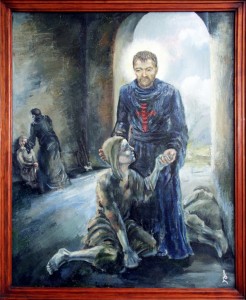 (Paternity) and your R.R. (Reverends) and at the same time give them news that our Prefect Father on the twenty-first of this month (June) went to bed with a fever and on the fourth plague was discovered in him and thus the bubo came out: he has already taken Viaticum and Holy Oil and we fear that the next night he will pass from this to a better life’. ‘Indeed, he died the same night or the following night and we find his certificate of death in the registers of the plague hospital of St. Gregory: ‘the twenty-seventh day of the month of June, Rev. Priest Belcastro, aged 62, died of the plague in the judgement of Rossore, physician, collector’.
(Paternity) and your R.R. (Reverends) and at the same time give them news that our Prefect Father on the twenty-first of this month (June) went to bed with a fever and on the fourth plague was discovered in him and thus the bubo came out: he has already taken Viaticum and Holy Oil and we fear that the next night he will pass from this to a better life’. ‘Indeed, he died the same night or the following night and we find his certificate of death in the registers of the plague hospital of St. Gregory: ‘the twenty-seventh day of the month of June, Rev. Priest Belcastro, aged 62, died of the plague in the judgement of Rossore, physician, collector’.
The loss of the Father and the leader – and then what a Father and what a leader – at the hour of greatest need – was to give rise to momentary dejection in his religious. For that matter, they were rather prepared for that harsh trial, and the legacy of this Father echoed in their hearts ‘promise of life and glory in death’. They committed themselves to nothing else but this.
The death of the Superior General was followed a month later by that of Fr. Francesco Antonio d’Agostino. His preferred apostolate, as well, was to be at the bedside of the dying in the private homes of the citizens. For some time he was at the plague hospital of Santa Barnaba, probably to take the place of Fr. De Caro while the latter had the plague, and then returned to his enormous field of work with great zeal and charity. After ‘for a good space [of time] administering the Most Holy Sacraments’, he contracted the plague. Supported, with piety and fervour, by these heavenly comforts that he himself had given with charity to so many others, ‘with acts of perfect religion’, he went to that death ‘much more enviable than envied’ for which he had prepared himself as though it were a prize.
But the most characteristic figure, let us use these terms, remains Brother Olimpio Nofri. Our chronicler draws upon all his artwork to portray this humble and great hero. He refers above all to the nobility of his aristocratic family in Sienna, his home town; then his modesty, his love of silence, his spirit of penitence, his zeal for the salvation of souls, his illuminated charity in caring for the sick, and above all this last which made him prefer to choose in the Religion the status of simple brother in order to express his talents in a better way.
In the virtue of charity for the sick, Nofri truly had an admirer and a judge of far greater worth than Regi – St. Camillus de Lellis himself. On 3 December 1608 this saint was in Genoa and had been informed by Father Sorrentino, the Superior in Milan, that he intended to remove Nofri from the post of ‘major nurse’ at the hospital and entrust him with collecting alms given the exceptional needs of the community.
Camillus wrote on that date two letters – one to Father Sorrentino and one to Brother Nofri. Camillus, who was no longer the Superior General, advised Sorrentino, albeit with authority, ‘not to pay attention to anyone’ and for the ‘glory of His Divine Majesty, for the building up of our Religion and for the benefit of the sick poor’ and even ‘for the discharging of [his] conscience’, to leave Nofri at his post of ‘general nurse’ because he was one of those few men of whom it could be said ‘he is worth a thousand men’ and he was ‘excellent’ in that job. Contemporaneously he wrote to Nofri that he should stay in the hospital at his job ‘very willingly’, that he himself ‘very much wanted this’ and that ‘he would have achieved much’ if he had decided to do this.
When this had been done he felt ‘very satisfied’ and wrote again: ‘Praise be to the Lord and may he be served though these poor members of Christ. Attend, my brother, to [their] care with all diligence and make your song [that they lack] for nothing, both in spiritual things and corporal things, by day and also by night’.
It is no wonder, therefore, that a religious who deserved so much commendation was able and wanted to sacrifice himself to the point, and in the way, that we are about to relate.
Brother Nofri, at the beginning of the year 1630, was responsible for collecting alms. There is no reason to be surprised by this, knowing that the express wish of the Founder was that this good brother should remain in the hospital. One should not forget that twenty-two years had passed and Brother Nifri was by now almost completely consumed by his hard work in the hospital. Regi himself clearly provides a second reason. No other religious, after the events that had taken place, could attend to such a task with the grace of he who obtained the aid of the earth, only asking for it, by speaking of the things of heaven and with his modesty.
As soon as the plague made its appearance, the good brother – despite the weight of his years and his maladies – put himself forward and asked to have his part of the hard work and the merit. He left the office of collecting alms and returned to his position of head nurse at the hospital, taking the place of Brother Terzago who had gone to the plague hospital of Santa Barnaba.
A nurse-apostle, to employ the sublime concept of the Founder St. Camillus, who had grown up, indeed was trained, in his school, was filled with ardour to work hard for the sick. He put all his physical, intellectual and spiritual resources to most good effect and for a very sublime cause.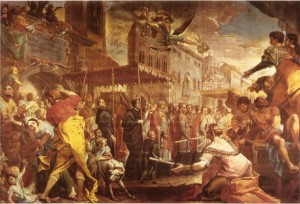
He served the sick with the respect and the love with which God is served and at the same time opened up in the hearts of the sick the way of grace and the way of the love of God. He exhorted them to have patience, and penitence; he managed to work with so much effectiveness that not rarely, from being rebels, from being hostile, from being hardened sinners, he managed to make them apostles of suffering, the voluntary victims of their own sins and the sins of the world.
Rich in very many and indeed happy merits acquired, he saw with a peaceful spirit the hour of his death approach. First a fever, then a bubo and some pustules, ‘the heralds of death’, warned him of what was – and he was acquainted with it only too well – the plague.
He left the hospital where he could no longer remain without being a danger to others, and betook himself to the ‘big tile’, to Porta Ludivica (the current Via Quadronno), where the Camillian Fathers had received as a gift from Msgr. Besozzo a country house which they used from one period to another as a place to live when they worked at the hospital.
With the spread of the disease, and in agreement with the administrator of the Major Hospital, which provided them with what they needed, the Fathers used that house as a refuge for their confreres who had been infected by the plague, calling it for that reason, subsequently, the ‘house of death’
Brother Olimpio Nofri, before he had no physical strength left, presented himself with the best attitude of mind to receive the Most Holy Sacraments. He was then shut up in that house. In its garden a large ditch had been dug and maintained to bury those religious whom the plague gave to the arms of death. Brother Nofri had built at the head of that ditch a hut. Putting a rope around his belt he tied the other end on the opposite side of the hole to a column of the house. On his death the religious, his confreres, by cutting the rope would be able to make the corpse fall – without any difficulty – into the underlying hole, sprinkle it with holy water, say some prayers and cover it with earth with piety.
When his confreres saw and understood all of this, they felt revulsion and underwent great suffering: they do not want, following any pact, that a man who was elderly and with so many merits should die abandoned in that way. But there was no way of shaking him from his resolve. He answered them that this was the right way to do things and that this was the best thing that could be done with him: allow him to die without other sick people being not helped because his needs were being attended to and other confreres being exposed to the danger of being infected by the plague.
This is what he wanted and this is what took place. Taken up in loving conversations with the Crucified Christ, whom he held in his hands, he awaited death, which, indeed, did not delay in opening up for him the compassionate gate of heaven.









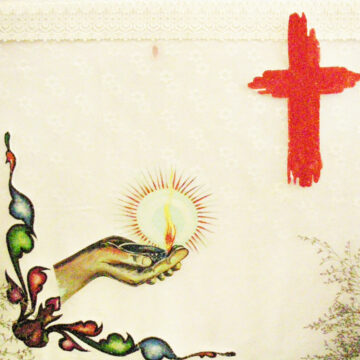
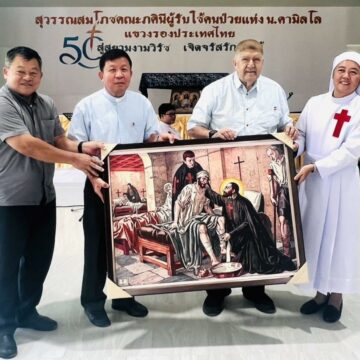
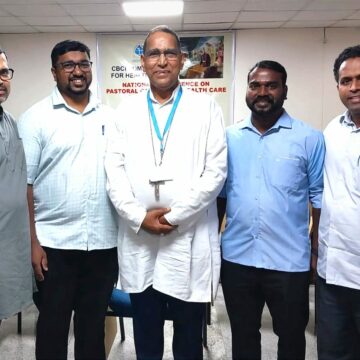


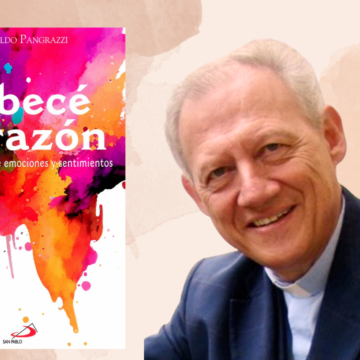
Camillians on Facebook
Camillians on Twitter
Camillians on Instagram